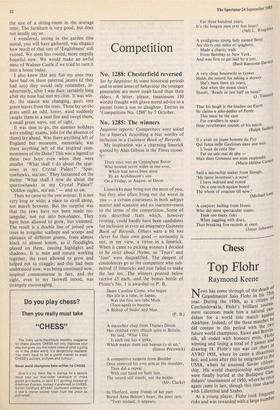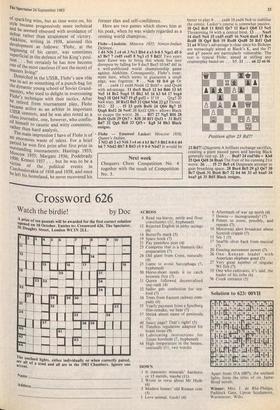Chess
Top Flohr
Raymond Keene
News has come through of the death Of Grandmaster Salo Flohr in his 75t h , year. During the 1930s, as a citizen '3' Czechoslovakia, Flohr's brilliant tourna- ment successes made him a natural can- didate for a world title match against Alekhine. Indeed, of the three matches he did contest in this period with the tv'', future world champions, Euwe and Butv111- nik, all ended with honours even, Flohr, winning and losing a total of 5 games On drawing 18, Flohr's run was cut short at AVRO 1938, where he came a disastrous last, and soon after this he emigrated to the USSR, where he assumed Soviet citizen- ship. His world championship aspirations were finally buried at the Budapest Can- didates' tournament of 1950, where he once with th inLcialimeneinal and Szabo. last, thzoaugoh. this time shared As a young player, Flohr took frequent risks and was rewarded with a large number of sparkling wins, but as time wore on, his style became progressively more technical and he seemed obsessed with avoidance of defeat rather than attainment of victory. Alekhine, writing in 1938, assessed this development as follows: 'Flohr, at the beginning of his career, was sometimes superficial in the defence of his King's posi- tion „ . but certainly he has now become one of the most cautious (if not the most) of masters living!' Domiciled in the USSR, Flohr's new role Was to act as something of a punch-bag for the dynamic young school of Soviet Grand- masters, who used to delight in overcoming Flohr's technique with their tactics. After he retired from tournament play, Flohr became active as an arbiter in important USSR contests, and he was also noted as a chess journalist, one, however, who confin- ed himself to caustic and witty comments, rather than hard analysis. The main impression I have of Flohr is of an enormous waste of talent. For a brief Period he won first prize after first prize in outstanding tournaments: Hastings 1933; Moscow 1935; Margate 1936; Podebrady 1936; Kemeri 1937 . . . but he was to be a victim of the political events in Czechoslovakia of 1938 and 1939, and once he left his homeland, he never recovered his
former elan and self-confidence.
Here are two games which shows him at his peak, when he was widely regarded as a coming world champion.
Flohr—Lissitzin: Moscow 1935; Nimzo-Indian Defence.
1 d4 Nf6 2 c4 e6 3 Nc3 Bb4 4 e3 0-0 5 Nge2 d5 6 a3 Be7 7 exd5 exd5 8 Ng3 c5 9 Bd3! Two years later Euwe was to bring this whole line into disrepute by falling for 9 dxc5 Bxc5 10 b4? d4! in a well-publicised world championship game against Alekhine. Consequently, Flohr's treat- ment here, which seems to guarantee a small edge, was fogotten. 9 ... Nc6 10 0-0 g6 Or 10 ... cxd4 11 exd4 Nxd4 12 Bxh7 + and Qxd4 with advantage. 11 dxc5 Bxc5 12 b4 Bd6 13 b5 Ne5 14 Bet Neg4 15 Bbl h5 16 h3 h4 17 hxg4 hxg3 18 Qd4 Nd7 19 g5 gxf2 + If 19 ... Qxg5 20 Ne4 wins. 20 Rxf2 Bey 21 Qh4 Nb6 22 g3 Threat: Rh2. 22 15 23 gxf6 Bxf6 24 Qh6 Bg7 25 Qxg6 Rxf2 26 Ne4! 26 Kxf2 Qf6 + allows Black to escape the worst. 26 ... Rf7 27 Ng5 Rf6 28 Bxf6 Qxf6 29 Qh7 + Kf8 30 Rfl Qx11 + 31 Bx11 Bd7 32 Qg6 Be8 33 Qf5 + Kg8 34 Bh3 Black resigns.
Flohr — Emanuel Lasker: Moscow 1936; Queen's Indian. 1 Nf3 d5 2 e3 N116 3 eel e6 4 b3 Be7 5 Bb2 0-0 6 d4 b6 7 Nbd2 Bb7 8 Bd3 c5 9 0-0 Nbd7 It would be
Next week Chequers Chess Competition No. 4 together with the result of Competition No. 3.
better to play 9 ... cxd4 10 exd4 Nc6 to stabilise the centre. Lasker's course is somewhat passive. 10 Qe2 Rc8 11 Rfdl Qc7 12 Rad Qb8 13 Ne5 Threatening f4 with a central bind. 13 ... NxeS 14 dxe5 Ne4 15 exd5 exd5 16 Nxe4 dxe4 17 Bc4 Rcd8 18 Qg4 Bc6 19 RxdS QxdS 20 Rdl Qa8 21 a4 White's advantage is clear since his Bishops are menacingly aimed at Black's K, and the f7 and g7 pawns are particularly vulnerable. The text is typical Flohr, aimed at stifling any counterplay based on ... b5. 21 ... a6 22 e6 16 Position after 23 Rd7/ 23 Rd7! (Diagram) A brilliant exchange sacrifice, creating a giant passed pawn and leaving Black generally tied up. 23 ... Bxd7 24 exd7dis + Kh8 25 Qe6 Qd8 26 Bxa6 The fruit of his cunning 21st move. 26 f5 27 Bey c4 Desperate attempt to gain breathing space. 28 Bxc4 Bc5 29 g3 Qe7 30 Bc7 Qxe6 31 Bxe6 Be7 32 b4 h6 33 a5 bxa5 34 bxa5 g6 35 Bd5 Black resigns.







































 Previous page
Previous page